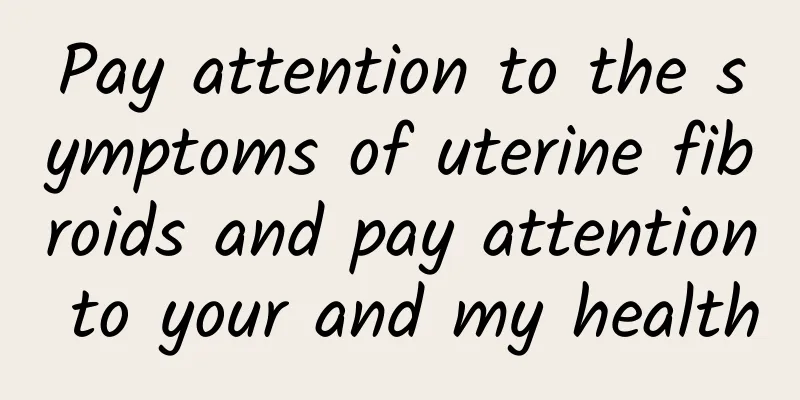Pay attention to the symptoms of uterine fibroids and pay attention to your and my health

|
What are the main symptoms of uterine fibroids? How much do you know about the symptoms of uterine fibroids? Based on which common symptoms of uterine fibroids can we judge that we have uterine fibroids? 1. The first symptom of uterine fibroids is: menorrhagia. The typical symptom of uterine fibroids is menorrhagia, which mostly occurs in submucosal and intramural fibroids, and manifests as menorrhagia, prolonged menstruation or irregular vaginal bleeding. The main reasons for increased bleeding are: the increase of endometrial area, the proliferation of endometrium due to the effect of estrogen, the fibroids hinder the contraction of uterus, and affect the blood circulation, causing endometrial congestion. Due to long-term bleeding of the lower abdominal mass, patients often have varying degrees of anemia. 2. Compression is also a common symptom of uterine fibroids: Fibroids located in the lower part of the uterus and the cervix can compress pelvic tissues and nerves, causing lower abdominal pain and back pain. Fibroids growing forward or backward can compress the bladder, urethra or rectum, causing frequent urination, dysuria, urinary retention or constipation. When fibroids grow to both sides, they form broad ligament fibroids, which can compress the ureter and cause hydroureteral or renal pelvis; if they compress pelvic blood vessels and lymphatic vessels, they can cause lower limb edema. 3. Abdominal mass: When the subserosal or intramural fibroids grow beyond the pelvic cavity, patients can usually feel the mass themselves and go to the hospital for treatment, which may be accompanied by a feeling of falling. 4. Pain: In addition to the pain caused by compression of the pelvic nerves, pedunculated submucosal fibroids cause uterine contractions in the uterine cavity and produce pain. When the fibroids block the cervical canal and hinder the outflow of menstrual blood, it can cause dysmenorrhea. This is also a symptom of uterine fibroids that we need to pay attention to. The above symptoms of uterine fibroids are what we women can judge by ourselves. If you cannot make an accurate judgment, please consult our online experts, who will give you more suggestions and opinions on the symptoms of uterine fibroids. Uterine fibroids http://www..com.cn/fuke/zgjl/ |
<<: Understand the difference between vulvar leukoplakia and other diseases
>>: Do you know how to treat uterine fibroids?
Recommend
Can I drink coffee during my period? Not really
Coffee can relieve fatigue and refresh the mind, ...
Etiological classification of patients with hyperprolactinemia
In daily life, we need to pay attention to hyperp...
What causes left ovarian cyst?
Treatments for left-sided ovarian cysts include m...
Detailed introduction to pelvic peritonitis
Pelvic peritonitis mainly refers to inflammation ...
Is Fuyankang Tablet effective in treating pelvic inflammatory disease?
If female patients are sensitive to Fuyankang tab...
How to eat at a convenience store? 10 good things for building muscle and reducing fat revealed
The most frightening thing during the fat loss pe...
What is the age range for menopause?
48 years old is indeed in the menopausal age rang...
What are the items to check for premature ovarian failure
What are the tests for premature ovarian failure?...
Under what circumstances does candidal vaginitis usually occur?
Under what circumstances does candidal vaginitis ...
What is the cause of black residue in menstruation after miscarriage?
Some women have black menstrual residue after abo...
Can you get pregnant with multiple uterine fibroids? Can multiple uterine fibroids cause infertility?
Uterine fibroids bring great trouble to patients....
What are the drugs for treating Bartholinitis?
Bartholin's glands are a relatively common gy...
Clinical symptoms of ovarian tumors
What are the symptoms of ovarian tumors? What are...
How to resolve the recurrence of Bartholin's gland cyst
If Bartholin's gland cyst recurs, you need to...
Postoperative abortion health care measures are what women should pay attention to
Women must take all kinds of health care measures...









